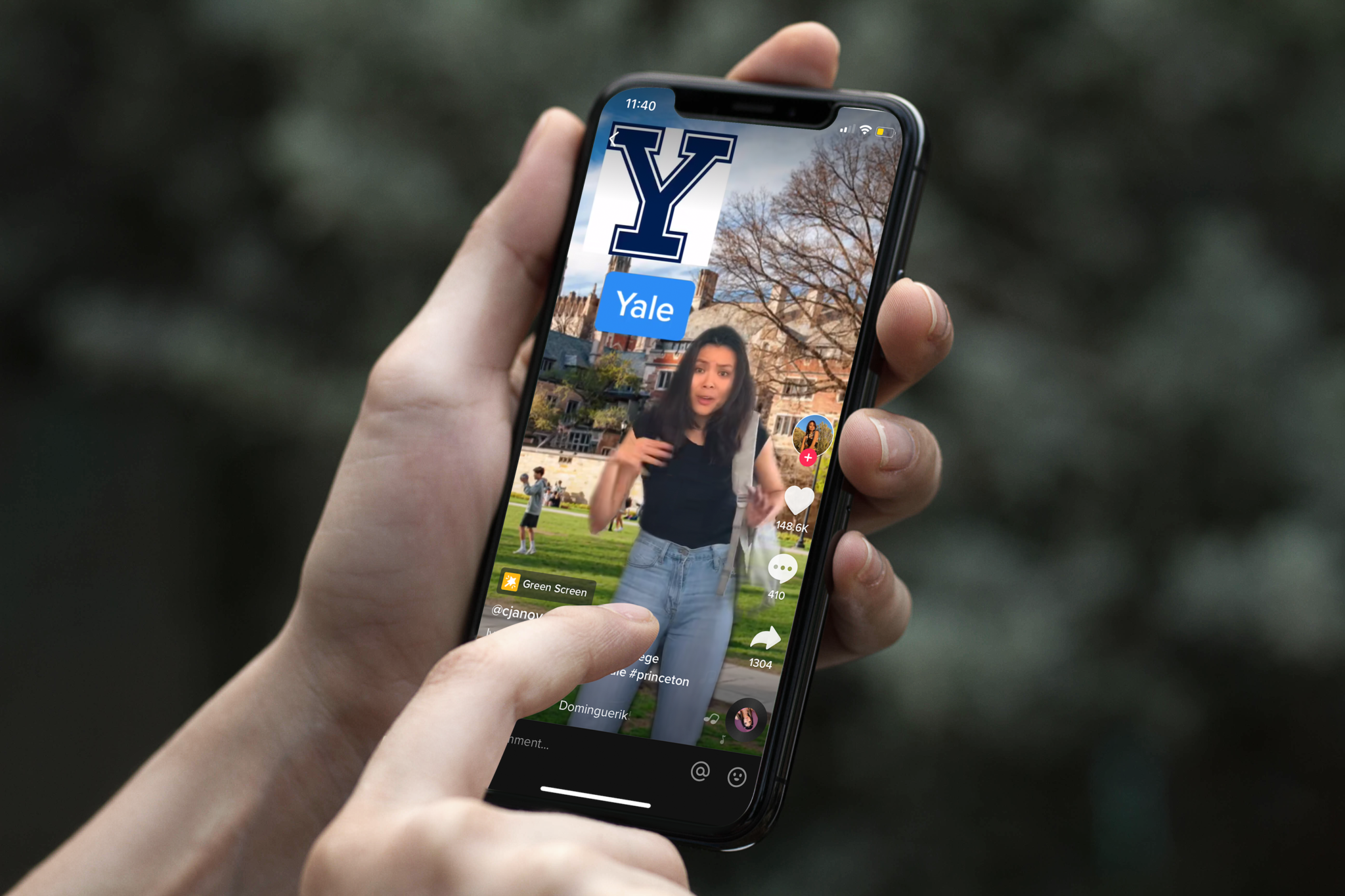
Marissa Blum, Contributing Photographer
The U.S. government has recently taken a series of actions against the Chinese social media app TikTok, which is used to create short music, dance and comedy videos. With half a billion users around the world, the app has become a global sensation for children and young adults alike.
On Aug. 6, President Trump passed an executive order effectively banning the use of TikTok in the United States, citing security concerns with the app. On Sept. 18, TikTok filed a lawsuit against the Trump administration, preventing the executive order from being enforced as planned. Last Sunday, a federal judge halted the ban set to take effect later that day. Members of the Yale Law School’s Paul Tsai China Center criticized the ban.
Simultaneously, an ongoing Committee on Foreign Investment in the United States, or CFIUS, investigation into the app is set to run until Nov. 12. Also on the table is a proposed acquisition of TikTok by computer technology corporation Oracle and, possibly, Walmart.
“All of these are related, but overlapping strands of the U.S. government’s efforts to essentially block TikTok from operating in the U.S. or create an alternative structure where TikTok would be acquired by a U.S. firm,” said Samm Sacks, senior fellow at the Paul Tsai China Center.
Sacks’ research investigates China’s information and communications — or ICT — policies, focusing on China’s cybersecurity legal system, the China-U.S. technology relationship and the geopolitics of data privacy and cross-border data flows.
WHAT’S WRONG WITH TIKTOK?
Sacks believes the U.S. government has three issues with TikTok.
According to Sacks, the first issue is TikTok’s identity as a massively popular Chinese company — one that has gained dominance around the world at a moment when the U.S. government views China and its technology as an existential threat to U.S. economic and security interests.
“TikTok is in the crosshairs because it is a large, globally dominant Chinese tech firm,” Sacks said.
The second issue pertains to data security. The U.S. national security community argues that data collected through the app could potentially be sent back to Beijing. Some concerns cite that the Chinese government could then use this data to create dossiers on American citizens to be used for coercive or blackmail purposes or to strengthen China’s artificial intelligence algorithms, Sacks said.
“I think that that risk is pretty far-fetched, to be frank,” Sacks said. “The idea that the algorithm that is meant to feed content could then be used to train deployment of a missile sort of demonstrates a lack of understanding of how the technology actually works. Not to mention the fact that TikTok has gone to great lengths to cordon off the data from China.”
The third risk regards censorship, as the algorithm within the app is very powerful, Sacks said. The app collects data, learning more about what users want to see, and can feed content that could potentially manipulate a user’s behavior. One concern is that the Chinese government could then use the app to extend its censorship regime outside of China by removing content about Xinjiang or Hong Kong, for example, or boosting Chinese Communist Party propaganda.
“Again, I think this is also far-fetched in that, is the US government that weak that it would be destabilized by Chinese communist propaganda which is notoriously heavy-handed?” Sacks said. “I think users would see that and just quit the app, which isn’t in TikTok’s interest at all if the goal was to get users sucked.”
WHAT’S NEXT: WILL A BAN HELP?
Some Yale students have taken full advantage of the platform, embracing their role as content creators. Two students, Tia Chitty ’24 and Leleda Beraki ’24, have both created TikToks with hundreds of thousands of views.
Chitty posts TikToks as a student studying remotely in Australia. “From embarrassing attempts at dances to some funny skits, I just hope to put a smile on people’s faces,” Chitty said. “One thing I love about TikTok is that the videos are really short, but they can have a big impact on people and seeing one uplifting TikTok video can turn your day around.”
Beraki, while now posting videos less frequently with classes in full swing, shared similar sentiments. “My account started out kind of as a joke during senior year, and it grew much faster than I expected,” she said. “I used to make some dancing videos, some hair tutorials and a couple college ones. Honestly, it was just a place where I reflected my mood or what happened in my day.”
Sacks, Chitty and Beraki agree that there are better ways to deal with the potential security risks associated with TikTok than banning the app.
“There are real vulnerabilities on the Internet right now, and they’re not actually unique to TikTok,” Sacks said. We need to have a U.S. federal privacy law that regulates how all companies, whether they’re Chinese or whether they’re American [operated].”
Paul Tsai China Center Executive Director Robert D. Williams also expressed that there are better ways to protect data security than by banning TikTok.
“The U.S needs to implement data protection legislation that sets high standards across the board for all companies that operate in the American market, regardless of nationality,” Williams said. “National security concerns should be addressed in a way that is consistent with our Constitution and avoids mirroring China’s approach of banning specific internet programs.”
If the concern is about sending data back to the Chinese government, Sacks favors auditing the data and examining the mediation measures TikTok has in place. This would mean an in-depth analysis of TikTok’s system and its effectiveness.
“Ostensibly, that’s what CFIUS is doing,” Sacks said. “Then, the question is, has the CFIUS process been politicized or not?” Sacks said.
Beraki and Chitty also shared sentiments that TikTok’s potential ban is less than ideal.
“I don’t think banning an app should be anyone’s priority,” Beraki said. “I’d honestly be super disappointed if it was banned because our government should not be swift about a silly app when real issues are constantly being ignored.”
According to Chitty, banning TikTok does not solve the problem in the U.S. She said that there are “better solutions that we can come up with that don’t involve banning the app.”
A likely scenario is that the Chinese government will block a potential deal with Oracle, Sacks said. There are export controls in place, which would allow them to decline selling off the company, particularly the algorithm. Sacks does not believe the answer is to force a sale to a U.S. buyer like Oracle — because it sets a precedent in which multinational companies, in exchange for market access worldwide, may be forced to sell off a stake to a domestic firm.
“Or, another likely scenario is that the Oracle-Walmart deal does go through, and the Trump administration has just enriched one of its political allies in a kind of forced national evasion of a company,” Sacks said.
As the U.S. presidential election approaches, some election security discussions have identified TikTok as a threat. Even if the Chinese government were to use TikTok to insert Chinese propaganda into U.S. information systems — or the minds of U.S. teenagers — Sacks does not consider it an election security issue.
“Chinese information operations tend to focus on Chinese domestic issues like controlling the narrative around the origins of the virus, or sovereignty in the South China Sea, [or] controlling dissidence in Hong Kong and Xinjiang,” Sacks said. “This is very different than election interference, which is much more of a Russia game. And would China intervene on behalf of Biden or Trump? It’s not clear if they have a horse in this fight.”
TikTok has approximately 100 million active monthly users in the U.S. alone.
Zach Morris | zach.morris@yale.edu








